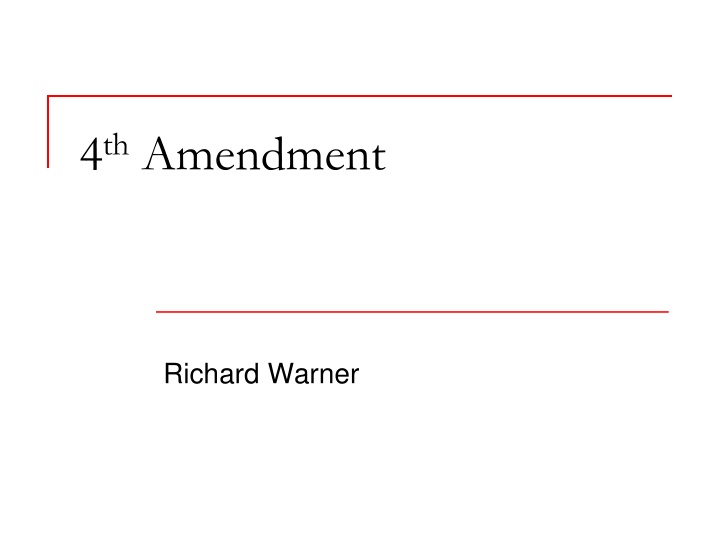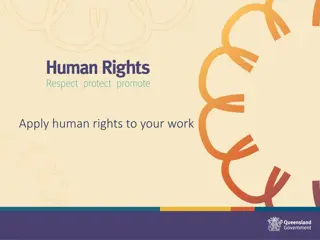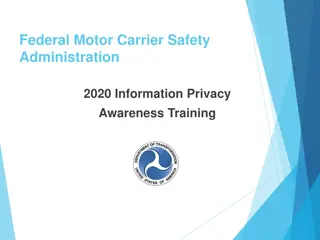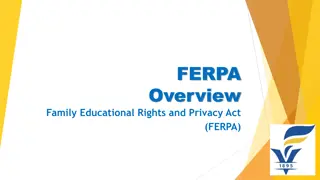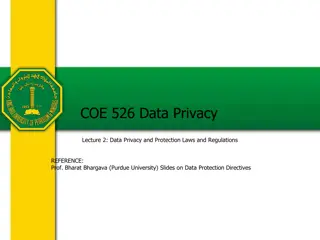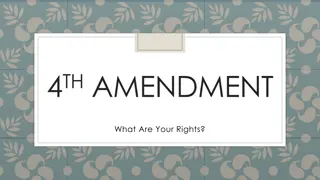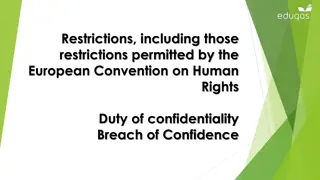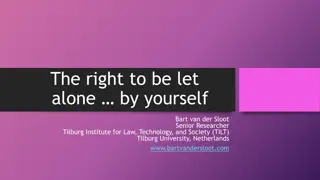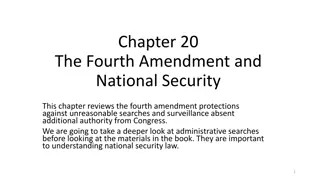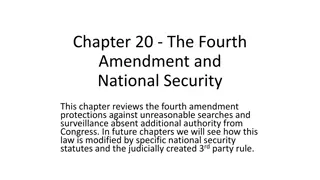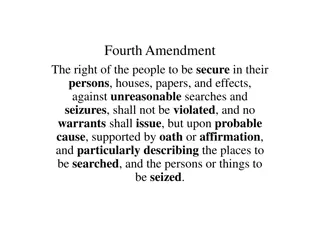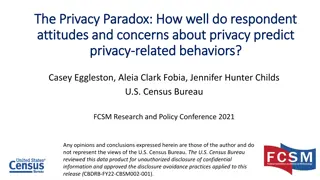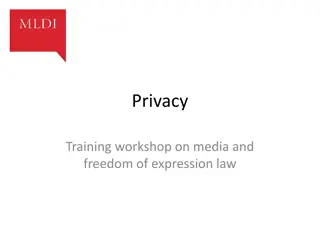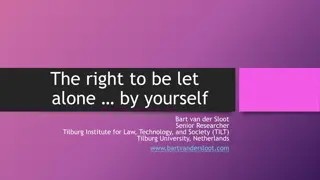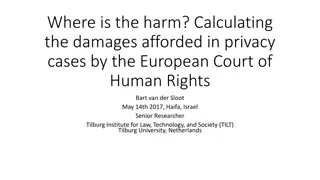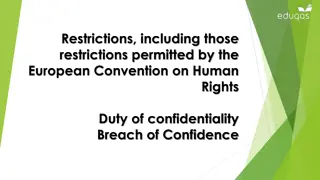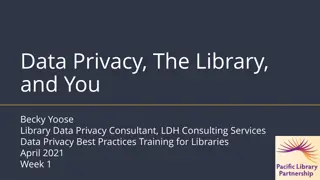4th Amendment and Privacy Rights
The 4th Amendment protects individuals from unreasonable searches and seizures by the government, requiring warrants based on probable cause. It establishes zones of privacy in persons, houses, papers, and effects. Understanding warrant requirements, probable cause, and law enforcement data acquisition is essential to upholding privacy rights and cybersecurity.
Download Presentation

Please find below an Image/Link to download the presentation.
The content on the website is provided AS IS for your information and personal use only. It may not be sold, licensed, or shared on other websites without obtaining consent from the author.If you encounter any issues during the download, it is possible that the publisher has removed the file from their server.
You are allowed to download the files provided on this website for personal or commercial use, subject to the condition that they are used lawfully. All files are the property of their respective owners.
The content on the website is provided AS IS for your information and personal use only. It may not be sold, licensed, or shared on other websites without obtaining consent from the author.
E N D
Presentation Transcript
4thAmendment Richard Warner
Where It Fits The 4thAmendment is a traditional privacy topic. But it is also a cybersecurity topic. Part of keeping data secure is knowing rights against government seizure of data .
4thAmendment The right of the people to be secure in their persons, houses, papers, and effects, against unreasonable searches and seizures, shall not be violated, and no Warrants shall issue, but upon probable cause, supported by Oath or affirmation, and particularly describing the place to be searched, and the persons or things to be seized.
So . . . There is a zone of privacy secure in their persons, houses, papers, and effects that cannot be invaded without a warrant. How do we define that zone?
A Question of How High the Hurdle Should Be The state is institutionalize power. Power corrupts.
The Warrant Requirement A warrant is a written order signed by a court authorizing a law-enforcement officer to conduct a search, seizure, or arrest. Probable cause exists when the facts and circumstances within the police officer's knowledge provide a reasonably trustworthy basis for a man of reasonable caution to believe that a criminal offense has been committed or is about to take place See Carroll v. United States, 267 U.S. 132 [1925].
The Warrant Requirement Particularly describing: Warrants must provide enough detail so that an officer with the warrant can ascertain with reasonable effort the persons and places identified in the warrant. Neutrality; The magistrate before whom an officer applies for a warrant must be neutral and detached.
A Recurrent Problem Law enforcement needs data to establish probable cause. So you can t require a warrant for every government acquisition of data. So which one s require a warrant?
Confidential Informants Should the police be able to use confidential informants without a warrant? A confidential informant is "any individual who provides useful and credible information to a Justice Law Enforcement Agency (JLEA) regarding felonious criminal activities and from whom the JLEA expects or intends to obtain additional useful and credible information regarding such activities in the future. CI Guidelines I.B.6 at B-8. (a) Yes (b) No
Bank Accounts To control money laundering, terrorism, organized crime, and tax evasion, should the government have access to bank records without a warrant? (a) Yes (b) No
Law Enforcement Opinion 1978, FBI Director Webster: Not many people know very much about informants: and to many people, it's a queasy area. People are not comfortable with informants. There is a tradition against snitching in this country. However, the informant is THE with a capital "T" THE most effective tool in law enforcement today - state, local, or federal. We must accept that and deal with it.
Law Enforcement Opinion 2001 2013 FBI Director Mueller: Human sources are vitally important to our success against terrorists and criminals. They often give us critical intelligence and information we could not obtain in other ways, opening a window into our adversaries' plans and capabilities. Human sources can mean the difference between the FBI preventing an act of terrorism or crime, or reacting to an incident after the fact.
Six Cases Hoffa v. United States (1966) Katz v. United States (1967) Smith v. Maryland (1979) Jones v. United States (2012) Riley v. California (2014) Carpenter v. United States (2018)
Confidential Informants Hoffa v. United States: The 4thAm. protects the security a man relies upon when he places himself or his property within a constitutionally protected area, be it his home or his office, his hotel room or his automobile. But: The petitioner . . . was not relying on the security of the hotel room; he was relying upon his misplaced confidence that Partin would not reveal his wrongdoing.
The Risk of Disclosure to Others A critical question: did Hoffa seek to keep the information private? The Court answers no because The risk of being overheard by an eavesdropper or betrayed by an informer or deceived as to the identity of one with whom one deals is probably inherent in the conditions of human society. It is the kind of risk we necessarily assume whenever we speak. Is that true? (a) Yes (b) No
The Third Party Doctrine The Fourth Amendment does not prohibit the obtaining of information revealed to a third party and conveyed by him to Government authorities, even if the information is revealed on the assumption that it will be used only for a limited purpose and the confidence placed in the third party will not be betrayed. United States v. Miller, 425 U.S. 435, 445 (1976). This is the 3rdparty doctrine
Katz v. United States Katz transmitted wagering information by telephone from Los Angeles to Miami and Boston in violation of a federal statute. The police collected evidence by attaching a listening device to the outside of a phone booth.
The Phone Booth Enclosure The government argued that a phone both was not a place protected by the 4th Amendment. Katz argued it was.
The Katz Test 4th Amendment protection requires a subjective expectation of privacy that is objectively reasonable. How do you get an objectively reasonable expectation of privacy? By blocking others from access (?) (or from regulation). Katz did this when he went in the phone booth.
Smith v. Maryland Patricia McDonough was receiving threatening and obscene phone calls from a man who said he was the one who had robbed her. The man turned out to be Smith. She identified what she thought was his car, got the license plate number. The police got the phone correlated with the phone, and attached a pen register to the number. Records numbers dialed on a telephone.
The Use of the Pen Register Smith called McDonough, and, on the basis, the police got a warrant to search Smith s home. Smith claimed that the use of the pen register required a warrant (and hence that all the evidence collected as a result of the pen register use was inadmissible).
The Majority and the Katz Test No subjective expectation: People do not expect dialed numbers to be private because they realize that phone companies record dialed numbers. Not objectively reasonable: This Court consistently has held that a person has no legitimate expectation of privacy in information he voluntarily turns over to third parties. When he used his phone, petitioner . . . petitioner assumed the risk that the company would reveal to police the numbers he dialed.
Marshalls Dissent There is a subjective expectation of privacy. Selective disclosure: Those who disclose certain facts to a bank or phone company for a limited business purpose need not assume that this information will be released to other persons for other purposes. Compare us and Nissenbaum on norms.
Marshall: Objective Reasonableness Whether privacy expectations are legitimate within the meaning of Katz depends not on the risks an individual can be presumed to accept when imparting information to third parties, but on the risks he should be forced to assume in a free and open society. By its terms, the constitutional prohibition of unreasonable searches and seizures assigns to the judiciary some prescriptive responsibility.
Riley v. California A police officer stopped Riley for driving with expired tags, discovered his license had expired, and discovered two concealed guns. The officer arrested Riley and legally searched him, finding a smart phone. The officer found messages labelled CK in the phone. CK = Crip Killers, a term for members of the Bloods. The police searched the phone at the station and found evidence of an attempted murder. Riley claimed the search required a warrant.
A Warrant Was Required In 1926, Learned Hand observed . . . that it is a totally different thing to search a man s pockets and use against him what they contain, from ransacking his house for everything which may incriminate him. . . . If his pockets contain a cell phone, however, that is no longer true. Indeed, a cell phone search would typically expose to the government far more than the most exhaustive search of a house: A phone not only contains in digital form many sensitive records previously found in the home; it also contains a broad array of private information never found in a home in any form unless the phone is.
Alternative to 3rd Party Disclosure? What should the alternative be? A current law enforcement argument: You need the haystack to find the needle. If you don't have it, when you go to ask it, it's not going to be there. Keith Alexander, then Director of the NSA. How do you balance law enforcement need against the need for privacy, in particular privacy in public?
United States v. Carpenter (2018) The police constructed a network of accomplices, and placed Carpenter at the center of that network. The police use CSLI to show that Carpenter (Carpenter s phone) was at the location of the crimes.
Cell Site Location Data Cell phones continuously scan . . .for the best signal, which generally comes from the closest cell site. [They] tap into the . . . network several times a minute . . . even if the owner is not using one of the phone s features. Each connection generates a time-stamped record known as cell-site location information (CSLI).
Phone Company Data Collection Wireless carriers collect and store CSLI. They often sell aggregated location records to data brokers, without individual identifying information. [I]n recent years phone companies have also collected location information from the transmission of text messages and routine data connections. Accordingly, modern cell phones generate increasingly vast amounts of increasingly precise CSLI.
Carpenter Summary of Appeals Court Carpenter lacked a reasonable expectation of privacy in the location information collected by the FBI because he had shared that information with his wireless carriers. Given that cell phone users voluntarily convey cell-site data to their carriers as a means of establishing communication, the court concluded that the resulting business records are not entitled to Fourth Amendment protection. The Appeals Court cited Smith v. Maryland.
The Supreme Court while the third-party doctrine applies to telephone numbers and bank records, it is not clear whether its logic extends to the qualitatively different category of cell-site records. After all, when Smith was decided in 1979, few could have imagined a society in which a phone goes wherever its owner goes, conveying to the wireless carrier not just dialed digits, but a detailed and comprehensive record of the person s movements.
Carpenter: Seeking to Keep Private Seeking to keep data private: Reduced expectation of privacy in information knowingly shared with another. But diminished privacy interests does not mean that the Fourth Amendment falls out of the picture entirely (citing Riley) Miller: concerned negotiable instruments. Smith: Limited data collected by a pen register. Carpenter: Revealing location data.
Carpenter: Voluntary Disclosure Cell phone location information is not truly shared . . . cell phones and the services they provide are such a pervasive and insistent part of daily life that carrying one is indispensable to participation in modern society. Citing Riley. Second, a cell phone logs a cell-site record by dint of its operation, without any affirmative act on the part of the user beyond powering up . . . in no meaningful sense does the user voluntarily assume[ ] the risk of turning over a comprehensive dossier of his physical movements.
The Courts Holding We hold that an individual maintains a legitimate expectation of privacy in the record of his physical movements as captured through CSLI. Note how narrow this is.
A Final Issue Alan is walking in an area known for gang violence and is carrying what appears to be a heavy metal object in a bandana. The police stop and question him. Should the police be able to stop and question him without a warrant or a subpoena? (a) Yes (b) No
The Current Law The stop known as a Terry Stop requires only that the police officer have a reasonable articulable suspicion of involvement in criminal activity. Alan was carrying a lock to a locksmith. Just carrying a heavy object in a bandana is not enough. Now imagine more information from network analysis.
More Information From Analysis Suppose the police officer uses facial recognition to identify Alan. Discovers that an AI system assign Alan high risk of criminal behavior and identifies him as a gang member. Does the officer have a reasonable articulable suspicion that Alan is involved in criminal activity? (a) Yes (b) No (c) Not sure
A Traditional Limit Traditionally, a police officer s claim of a reasonable articulable suspicion of criminal involvement must be particularized based on an explanatory narrative constructed around behavior observed in the context at the time. In Alan s case, you have to tell a story based on observed facts that the connects carrying the bandana significant probability of criminal involvement. Is a statistical prediction from an AI system particularized ?
A Recent Case Kansas v. Glover, US Supreme Court, 140 S.Ct. 1183 (2020). Deputy Mehrer saw a pickup truck with Kansas plate 295ATJ. He ran the plate through the Kansas Department of Revenue's file service to find the truck was registered to Glover, who had a revoked driver's license. He assumed the registered owner of the truck was also the driver. He did not observe any traffic infractions and based solely on the information that the registered owner of the truck was revoked, he stopped the truck.
